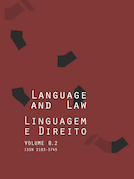WhatsApp e o contexto discursivo como prova de violência contra a Mulher
Abstract
In Brazil, the ‘Maria da Penha’ law (Law 11.340, of August 7, 2006) is concerned with the crime of feminicide and it creates mechanisms to protect wo- men who are victims of psychological and/or physical violence. Despite this law, the number of femicides increases daily. In 2015, the Map of Violence estimated the number of femicides at 4.8% per 100,000 women – one murder every 90 minutes and 5 beatings every 2 minutes – which placed Brazil in fifth place. The document showed that we had with the rise of the extreme right spreading patriarchal and sexist propaganda, a 30% increase in acts of violence against women is expected. However, states of violence and psychological violence caused by abusive relati- onships are not counted in these data. Within social media, there are countless semioses that denounce violence and abuse, which could be used as evidence in court, and even to prevent deaths. This article analyzes discursive stylistic marks present in WhatsApp messages exchanged between a victim of femicide and her best female friend – that indicate a state of violence, possible physical and psy- chological violence – in a case which had wide national repercussion. We use Discourse Analysis applied in a forensic linguistics context to discuss the crime of homicide, using as theoretical support van Dijk (2012), Charaudeau (2001), Cano (2012), and Sousa Silva and Coulthard (2016). The analysis raises interesting lin- guistic issues such as the concepts of “context” that evidence constant situations of state of violence within the interaction process.
Downloads
Published
How to Cite
Issue
Section
License
Copyright (c) 2022 Language and Law=Linguagem e Direito

This work is licensed under a Creative Commons Attribution-NonCommercial 4.0 International License.
Este trabalho está licenciado com uma Licença Creative Commons - Atribuição-NãoComercial 4.0 Internacional.






